Al-Zaytouna Centre for Studies & Consultations held on 24/1/2024, a seminar entitled “Anticipated Trajectories of the Palestine Issue in 2024 in Light of Operation al-Aqsa Flood,” with the participation of a selection of experts and researchers specialized in the Palestine affairs.
Moderated by Prof. Dr. Mohsen Mohammad Saleh, the seminar included eight papers that discussed the anticipated trajectories of the Palestine issue in 2024. The first paper was by Sari ‘Orabi, discussing the internal Palestinian scene; the second was by Mueen Al Taher on the performance of Palestinian resistance; the third was by Ziad Ibhais on Conditions in Jerusalem, while Dr. Mohannad Mustafa discussed the Israeli political and military behavior in the fourth paper. Prof. Dr. Walid ‘Abd al-Hay presented the fifth paper on the possible international stances on the Palestine issue, while the sixth paper was by Hani Al-Masri on the peace process and the day after the war on Gaza, and the seventh paper was by Dr. Said El-Haj on the anticipated trajectories of influential Arab and Muslim countries (Turkey, Egypt, Jordan, Saudi Arabia, Qatar). Finally, in the eighth paper, Prof. Dr. Talal ‘Atrissi addressed the anticipated trajectories of the resistance axis (Iran, Hizbullah, Syria, Iraq and Yemen).
Researchers, scholars and experts discussed the papers, with important interventions and questions, and the session was concluded by the answers and clarifications of the main speakers.
This session took place against the backdrop of the ongoing Operation al-Aqsa Flood, a pivotal event in modern Palestinian history, and in light of the brutal Israeli aggression on the Gaza Strip, and the above the law behaviour both within and outside Palestine. Also in light of the strong and effective performance of the resistance and the historic steadfastness of the people there.
Below are the details of the anticipated trajectories:
Dr. Mohanad Mustafa: Anticipated Trajectories of the Israeli Political and Military Behavior in 2024:
Critical Trajectories Await Israel in 2024
Israeli affairs expert expects the emergence of “Israel the Third” and an opposition victory in the upcoming elections, marked by an escalation in militaristic inclinations and worsening crises
Following Operation al-Aqsa Flood, on 7/10/2023 and Israeli aggression on Gaza, Dr. Mohanad Mustafa envisions the formation of “Israel the Third.” He observed that the fundamental question in “Israel the Third” would revolve around the state, rebuilding confidence in itself, and its ability to stabilize and persist. The search for capable “statesmen” with militaristic tendencies will be pivotal. “Israel the First” denotes the establishment in 1948, and “Israel the Second” followed the 1973 war.
On the domestic political front, Mustafa predicts the dissolution of the emergency government with the State Camp party’s departure, leading to new elections. An escalating protest against Prime Minister Benjamin Netanyahu is expected, resulting in the opposition winning the elections, and forming a government led by Benny Gantz.
Mustafa anticipates Netanyahu’s resignation from the Likud party and exit from politics. Constitutional changes initiated during his tenure will likely freeze, opening the way for new right-wing leaders like Yossi Cohen and Ron Dermer.
These insights were shared during a seminar titled “Anticipated Trajectories of the Palestine Issue in 2024 in Light of Operation al-Aqsa Flood,” organized by al-Zaytouna Centre for Studies and Consultations, on 24/1/2024, with the participation of numerous experts in Palestinian affairs.
Dr. Mohanad Mustafa also anticipates deepening divisions in Israeli society regarding Gaza’s political future and the two-state solution. An increase in militaristic tendencies, accompanied by racist trends, are expected. The secular-religious divide may worsen due to reduced privileges for the religious community.
Mustafa stated that Israel’s internal economic crisis will worsen due to the war’s impact on the economy. This will lead to a decline in living standards and a rise in the cost of living, especially with the high-tech sector shrinking. Meanwhile, government spending on the military and intelligence will increase, and an official inquiry committee into the failure of 7/10/2023 will be formed, fueling further divisions in the Israeli scene.
On a geopolitical level, Mustafa anticipated that the state of war with Gaza will continue, despite possible cessation of military operations, as Israel won’t achieve its objectives. He also expects escalating conflicts between Iran and Israel on different fronts, particularly in Syria. with Yemen becoming a priority for Israeli security, following its notable role in the Red Sea. Tensions will persist on the northern front, but without a full-scale war.
In terms of foreign policy, Mustafa anticipated renewed efforts for normalization with Arab countries under US influence if Israel’s government changes. However, he expected Israel’s international standing to decline due to its aggression on Gaza, straining relations with Russia and China.
Mustafa concluded that the outcomes of the war on Gaza would shape relations with Egypt, Jordan and Turkey. He doubted the success of US attempts to delineate Israel-Lebanon borders.
This paper was presented in a seminar, moderated by Prof. Dr. Mohsen Mohammad Saleh, that included eight papers and discussed the anticipated trajectories in 2024 related to Palestinian, Israeli, Arab, Islamic and international affairs.
Prof. Dr. Walid ‘Abd al-Hay: Anticipated Trajectories of the Possible International Stances on the Palestine Issue in 2024:
The Palestinian International Scene in 2024: Promising Opportunities and Significant Challenges
The International Court of Justice supports Palestine, US internal turmoil reflects on the region, more political pressure on Israel, and Palestinians blackmailed on support and reconstruction issues
International affairs expert Prof. Dr. Walid ‘Abd al-Hay anticipated that the likelihood of voting in favor of Palestine in the genocide case at the International Court of Justice would not be less than 9 to 10 votes, without ruling out the US exerting maximum pressure. He stated that the Palestinian side would face extortion regarding the funds needed for reconstructing what Israel destroyed in Gaza after the fighting stops. Political blackmail will characterize this issue since 82% of financial aid to Palestine comes from countries not supporting the political stance of armed Palestinian resistance. These countries will try to link aid to politically pressing conditions on the resistance’s positions.
‘Abd al-Hay emphasized that Operation al-Aqsa Flood had a profound impact on Israel’s image in the international public opinion. He believed this positive shift would continue, and Israeli-African relations are likely to become more tense. Only one African non-Arab country, Liberia, voted against the recent resolution in the General Assembly in December 2023.
These insights were shared during a seminar titled “Anticipated Trajectories of the Palestine Issue in 2024 in Light of Operation al-Aqsa Flood,” organized by al-Zaytouna Centre for Studies and Consultations, on 24/1/2024, with the participation of numerous experts in Palestinian affairs.
‘Abd al-Hay also added that the US policy in 2024 would experience some internal turmoil, driven by the continued annual decline in individual income since Biden took office, widening class gaps, a $121 billion increase in military spending between 2020 and 2024, and a US rise to 134th place in the Global Peace Index in 2024 from 83rd in 2008/2009, indicating worsening conditions. Additionally, electoral competitions are likely to center mainly around Trump and Biden, with Biden expected to win (based on Allan Lichtman’s model for prediction a winner). However, this does not preclude possibilities of increased divisions within the Democratic party’s base and elite.
‘Abd al-Hay stated that all of this would reflect on the burdens of the US role in the Middle East, thus worrying many Israeli leaders. He believed that US pressure towards Arab-Israeli normalization aims to reduce US involvement in cycles of violence in the Middle East, leading US to exert more pressure on Arabs to normalize to achieve some points that alleviate the negative aspects mentioned.
‘Abd al-Hay confirmed that the increasing international adoption of the two-state solution would put Israel in a state of confusion. If it accepts the two-state solution, violent disruptions instigated by settlers in the West Bank, along with the religious right, may occur. If it rejects it, it will face a dilemma in dealing with the international community from this angle. Therefore, it is likely, in his opinion, that Israel will accept the general framework of the solution, then try to empty it of its content, as it previously dealt with the Oslo Accords, then revert to dealing with Oslo.
This paper was presented in a seminar, moderated by Prof. Dr. Mohsen Mohammad Saleh, that included eight papers and discussed the anticipated trajectories in 2024 related to Palestinian, Israeli, Arab, Islamic and international affairs.
Mueen Al Taher: Anticipated Trajectories of the Performance of Palestinian Resistance in 2024:
Anticipated Trajectories of the Palestinian Resistance in 2024
A strategic expert anticipates the continuity of the resistance and its effectiveness, as well as a shift towards comprehensive resistance, with the war coming to an end before the end of the year
A strategic and military expert, Mueen al-Taher, anticipates the continued strength and effectiveness of the Palestinian resistance in Gaza Strip in confronting Israeli aggression for many months to come. He stated that the resistance, which Operation al-Aqsa Flood, achieved a “military miracle in the scientific sense of the word.” Al-Taher believes it can maintain a cohesive command and control system in the coming period, efficiently utilizing its weapons and ammunition, alongside dedicated, well-trained resistance fighters. He also suggests that the war is unlikely to continue throughout 2024 for various reasons. Even in the unlikely scenario of the enemy occupying the Strip, the resistance is capable of persisting and inflicting significant losses, albeit with varying tactics. Al-Taher highlighted the possibility of escalating resistance in the West Bank, especially given the increasing Israeli army and settler attacks on Palestinians and their lands.
Al-Taher emphasized that the trajectory of the war’s duration will be determined by the resistance’s performance on the ground, developments in the political situation, the state of Arab and Western public opinion, and the stance of the US administration and the European community.
These insights were shared during a seminar titled “Anticipated Trajectories of the Palestine Issue in 2024 in Light of Operation al-Aqsa Flood,” organized by al-Zaytouna Centre for Studies and Consultations, on 24/1/2024, with the participation of numerous experts in Palestinian affairs.
Al-Taher affirmed that the future of Palestinian resistance should not be solely dependent on Gaza Strip, emphasizing that the upcoming phase will be characterized by comprehensive resistance. This includes escalating military resistance in various forms, popular resistance, resistance against normalization, legal resistance, Arab and Western-level resistance to isolate Israel, and others.
Al-Taher added that one of the encouraging factors for the continuation of this resistance is the revival of the national movement in the Palestinian arena (including those who did not engage in security coordination within the Palestine Liberation Organization (PLO) and Fatah movement) to play its role as a participant, counterpart and guardian of the model established during Operation al-Aqsa Flood.
This paper was presented in a seminar, moderated by Prof. Dr. Mohsen Mohammad Saleh, that included eight papers and discussed the anticipated trajectories in 2024 related to Palestinian, Israeli, Arab, Islamic and international affairs.
Ziad Ibhais: Anticipated Trajectories of the Conditions in Jerusalem in 2024
Anticipated Trajectories of the Conditions in Jerusalem and al-Aqsa Mosque in 2024
An expert in Jerusalem affairs forecasts heightened aggression towards al-Aqsa mosque, increased efforts to Judaize the area, a stronger religious aspect to the conflict, and more frequent confrontations
Expert in Jerusalem Affairs Ziad Ibhais anticipates Israel to retaliate for events of 7/10/2023, through policies targeting al-Aqsa mosque and Jerusalem. He foresees clashes at the beginning of the upcoming Ramadan on 11/3/2024, regarding prayer and pilgrimages to al-Aqsa from Jerusalem, the West Bank and the 1948 occupied territories. This will open the door to continuing previous confrontations with even greater intensity. He also anticipates renewed attempts to finalize the displacement of Sheikh Jarrah and seven threatened neighborhoods in Silwan, along with Wadi al-Joz as part of the “New Silicon Valley” project.
These insights were shared during a seminar titled “Anticipated Trajectories of the Palestine Issue in 2024 in Light of Operation al-Aqsa Flood,” organized by al-Zaytouna Centre for Studies and Consultations, on 24/1/2024, with the participation of numerous experts in Palestinian affairs.
Concerning settlement expansion, Ibhais noted that Israel is working to strengthen Jerusalem’s identity by increasing settlement activity in the city center and determining its eastern borders. This could lead to settlement expansion in three main directions: entering the Old City through Christian properties, controlling remaining major real estate areas, and focusing efforts on Beit Hanina and Shu‘afat.
The crisis at the Industrial Secondary School (JISS)/ Arab Orphan Committee (AOC), where the administration in Amman struggles to respond, may escalate into a major issue. Additionally, there may be renewed efforts to decide the fate of the Jerusalem wilderness towards Ma‘ale Adumim, including a new attempt to relocate Khan al-Ahmar.
Ibhais suggests that Operation al-Aqsa Flood could change the demographics of Israel, where secular Zionists may leave coastal areas while settlers remain, leading to a demographic shift similar to Jerusalem’s current makeup, with more religious representation. This indicates that the Jerusalem situation may become more heated, but less economically productive and more reliant on external aid.
This paper was presented in a seminar, moderated by Prof. Dr. Mohsen Mohammad Saleh, that included eight papers and discussed the anticipated trajectories in 2024 related to Palestinian, Israeli, Arab, Islamic and international affairs.
Sari ‘Orabi: Anticipated Trajectories of the Internal Palestinian Scene in 2024
Hani al-Masri: Anticipated Trajectories of the Peace Process and the Day After the War on Gaza in 2024
Anticipated Trajectories of the Palestinian Internal Situation and Political Solutions in 2024
Better chances for national reconciliation, with the outcome of the war playing a decisive role, while the peace process has not taken serious dimensions
Expert in Palestinian affairs, Sari ‘Orabi, anticipated four scenarios for the Palestinian internal situation. The first involves the continuation of the current situation with the division between Hamas and Fatah as it is, which, despite being weakened by the war, remains plausible. The second scenario involves reaching a national agreement to manage the post-war phase, aiming to end the schism, lift the siege, rebuild and prepare for comprehensive elections. This scenario is largely dependent on how the war concludes. These two scenarios are the most likely according to ‘Orabi.
These insights were shared during a seminar titled “Anticipated Trajectories of the Palestine Issue in 2024 in Light of Operation al-Aqsa Flood,” organized by al-Zaytouna Centre for Studies and Consultations, on 24/1/2024, with the participation of numerous experts in Palestinian affairs.
‘Orabi added two other scenarios, both less likely. The first is that the war ends with a clear victory for the resistance, led by Hamas. This would provide a stronger position for Hamas and a greater opportunity to impose its conditions on all levels, including the Palestinian internal situation. The second scenario is that the occupation manages to control the Gaza Strip (GS), achieving at least some of its goals in weakening or striking the resistance, drastically altering the Palestinian future. Both scenarios are unlikely based on available information.
‘Orabi stated that there are strong opportunities for the resistance and national workforces to enhance their popular, political and institutional presence, preventing attempts to isolate or sideline the resistance. This would also block the influential elite within the Palestinian Authority (PA) from further succumbing to Israeli pressures and demands. He added that this war, in general, provides better opportunities for serious national action.
On the other hand, Palestinian political affairs expert Hani Al-Masri affirmed that the trajectories of the peace process in 2024 are fundamentally linked to the outcomes of the GS war. He proposed three possible scenarios, favoring a scenario of “neither victor nor vanquished,” where each party claims victory, leading to political movement to overcome the stage and outline a new Middle East. Efforts would be made to neutralize and drain the resistance’s achievements by expanding the PA’s powers and influence, making it more compliant with Israeli demands.
The second scenario involves Israel’s control over GS, which is less likely. However, if it happens, the Israeli political path will continue to accelerate in its Judaization, displacement and annexation projects, with the PA leadership aligning more with Israeli dictates. In this case, there may be internal division within the PA and Fatah movement, with some factions of Fatah rejecting these dictates, while a faction of the PA remains obedient to Israel and implements its full demands. In such a scenario, Israel would achieve significant successes.
The best scenario, according to Al-Masri but the least likely, is the unification of Palestinian forces, especially the resistance forces, based on visions and programs aimed at ending the occupation. He said if this does not happen in the near future, someone else will fill this void.
Al-Masri stated that Operation al-Aqsa Flood brought global attention back to the Palestine issue after its decline, and the outcome of the war will reflect on the peace process in the coming stage. He pointed out that the current strong advocacy for the two-state solution reflects a global recognition of the severity of the situation. Neglecting the Palestine issue risks further unrest in the region and underscores the imperative to address the suffering of the Palestinian people. Additionally, the United States sees promoting a two-state solution as a means to reduce tensions and revitalize the peace process. Furthermore, it seeks to entice Saudi Arabia into normalizing relations with Israel under the guise of achieving progress. Nevertheless, Palestinians should refrain from endorsing the two-state solution until they consolidate their national unity and formulate a cohesive political strategy to navigate this phase.
This paper was presented in a seminar, moderated by Prof. Dr. Mohsen Mohammad Saleh, that included eight papers and discussed the anticipated trajectories in 2024 related to Palestinian, Israeli, Arab, Islamic and international affairs.
Dr. Said El-Haj: Anticipated Trajectories of Influential Arab and Muslim Countries (Turkey, Egypt, Jordan, Saudi Arabia, Qatar) in 2024
Prof. Dr. Talal ‘Atrissi: Anticipated Trajectories of the Resistance Axis (Iran, Hizbullah, Syria, Iraq and Yemen) in 2024
Anticipated Trajectories of Arab and Islamic approaches to the Palestine issue in 2024
Dr. Said El-Haj anticipated potential roles for Turkey in post-war reconstruction and relief efforts. Turkey maintains its proposal to serve as one of the guarantor countries in Gaza Strip (GS) following the cessation of hostilities. However, during the conflict, he does not anticipate any significant shift in Turkey’s politically sympathetic stance toward the Palestinian people, without increasing pressure on Israel, while sustaining its political and economic relations.
As for expectations concerning Egypt, it is unlikely that Egypt’s stance on the war will change in 2024. Egypt is anticipated to play a significant role in the post-war phase, particularly in the reconstruction process. El-Haj expects Egypt to adhere to its traditional policy of maintaining relations with Israel, potentially opening the Rafah crossing only within pre-existing agreements with Israel and the US. Additionally, Egypt is expected to continue to oversee the Palestinian reconciliation process.
These insights were shared during a seminar titled “Anticipated Trajectories of the Palestine Issue in 2024 in Light of Operation al-Aqsa Flood,” organized by al-Zaytouna Centre for Studies and Consultations, on 24/1/2024, with the participation of numerous experts in Palestinian affairs.
El-Haj envisions Qatar continuing its role as a mediator in prisoner exchanges, ceasefire agreements, and offering substantial financial and relief support to GS. Qatar is expected to sustain its active media presence, notably through Aljazeera, expressing solidarity with the resistance and capturing the sentiments of the Arab public. Additionally, Qatar will strive to uphold strong relations with the US, positioning itself as a trusted mediator while hosting Hamas leaders, actively engaging in regional politics.
In the case of Saudi Arabia, El-Haj anticipates a deceleration in the peacel process with Israel. The country is likely to refrain from participating in any initiatives until the final outcomes of the war on GS become clear. Saudi Arabia is expected to adhere to the traditional policies advocated by Mohammed bin Salman, emphasizing pragmatic elements in dealing with the Palestine issue.
Regarding Jordan, El-Haj expects the country to persist in its traditional policies toward Israel and US. There may be occasional adjustments to the political stance to align with popular pressures, with attempts to accommodate and absorb these pressures. The likelihood of Jordan opening up to Hamas and resistance forces depends on the effectiveness of the resistance in repelling aggression on the Strip and establishing itself as a more potent force in the Palestinian reality.
On a different note, Prof. Dr. Talal ‘Atrissi foresees the development of the resistance axis within the framework of the Palestine liberation strategy. He suggests that if Hamas achieves victory in Operation al-Aqsa Flood, the entire resistance axis will be considered triumphant. ‘Atrissi underscores that the unity of fronts, once a mere threat, has transformed into a serious and real force after Operation al-Aqsa Flood, marking a significant shift in the conflict with Israel, unprecedented since 1973.
‘Atrissi further highlights that Operation al-Aqsa Flood has exposed the extent of US and Western intervention and support for Israel. Therefore, the resistance axis must consider this when enhancing cooperation and coordination among its factions. He points out the notable role of the Yemeni front in providing significant support for the Palestinian resistance during Operation al-Aqsa Flood, urging the resistance to factor this into shaping its strategic vision.
This paper was presented in a seminar, moderated by Prof. Dr. Mohsen Mohammad Saleh, that included eight papers and discussed the anticipated trajectories in 2024 related to Palestinian, Israeli, Arab, Islamic and international affairs.



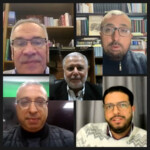
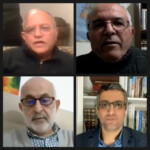




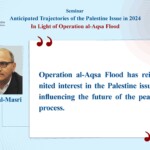
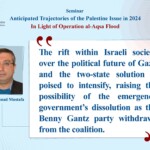
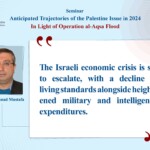
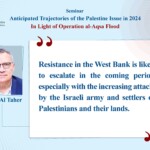
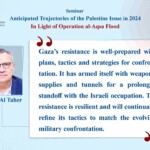
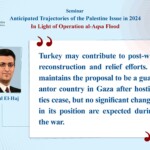
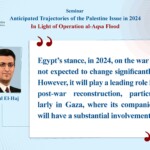
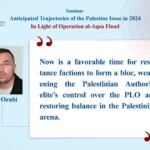
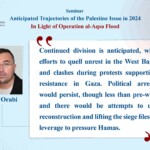

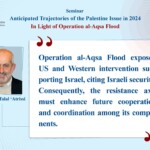
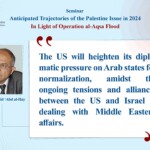
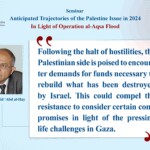



Leave A Comment